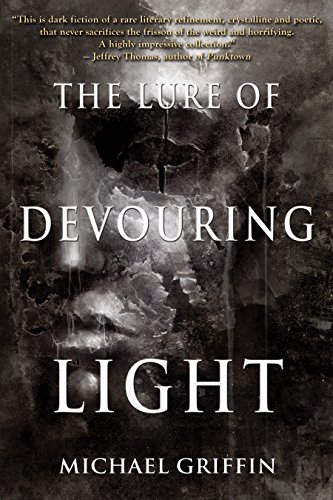Portland-based weird fiction writer Michael Griffin has quietly been building himself a reputation for quiet horror with regular appearances in key outlets like Black Static and Apex Magazine, as well as several anthologies, and this has now burgeoned with his first collection, The Lure of Devouring Light, from Word Horde. It’s a very generous and ambitious, collection, given that the eleven stories are often multi-part novelettes, or even novellas like “Far From Streets,” and quite a few are first-time appearances, like the equally lengthy “The Black Vein Runs Deep.”
Griffin is a craftsman of the highest order, and all of the works mark out their place with measured, well-turned prose. Sometimes the numinous content that situates Griffin in the weird camp feels as though it’s intruding among highly developed, edgy conceptions that could have already taken the story into arcane dimensions without supernatural aid, but that may be largely a matter of taste. It’s also an indicator of how invested Griffin is in characterization and relationships – this is not a Ballardian take on the Deeply Weird, where the ideas and underlying conceptions form an architectural diagram populated by caricatures. The Shapers from the story “The Jewel in the Eye,” physical forms literally crafted out of the wants or felt lacks of a women’s book club, might stand in for the nature and genesis of the weirdness in many of the other tales.
Temporal shifts, disconnects, bizarre lapses in continuity, accelerated changes, figure prominently, as in the fast-forwarded construction zone of “Diamond Dust” with its Ligottiesque chronicling of a literal hell in the workplace, or the maybe-alternative reality of “The Accident of Survival.” Occasionally Griffin’s prose feels like it has outrun its subject matter, but that again could be just a matter of taste, and if it is so, it augurs well for his future development. At times, also, the collection reads a little like serial distortions to middle-class life in Portland, OR, and it’s perhaps significant that one of the stories that reaches furthest outside this topos, “No Mask to Conceal Her Voice” drawing on Robert W. Chambers’s King in Yellow mythos, is also one that lingers most in the mind. Griffin has written more along these lines elsewhere, in Ross E. Lockhart’s Lovecraftian collection Cthulhu Fhtagn!, the Shirley Jackson Award-winning Thomas Ligotti tribute anthology The Grimscribe’s Puppets, and the Laird Barron tribute The Children of Old Leech, for example. His contributions there were real highlights, and perhaps more inclusion of those stories would have represented his range more fully. Perhaps it’s significant that the collection picks up, as does the pace, on the last stretch, with the novella “The Black Vein Runs Deep,” a yarn of dark, and deep, doings around an abandoned mine, where Griffin propels his tale with prose of greater economy and efficiency, despite his broader canvas. More proper nouns, concrete nouns, descriptions, plotting. Again, it’s an ending that leaves a reader ready for more, and I’m eager to see what Griffin comes up with next. Highly recommended.


Reblogged this on Don Massenzio's Blog.
LikeLike